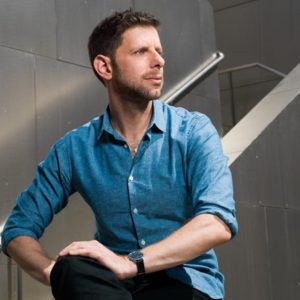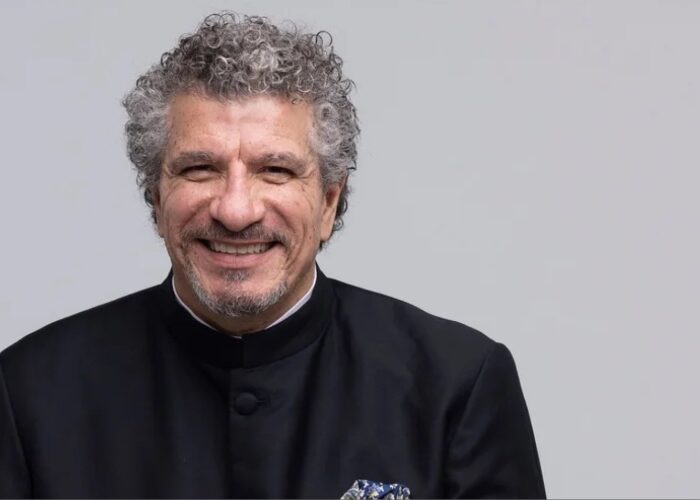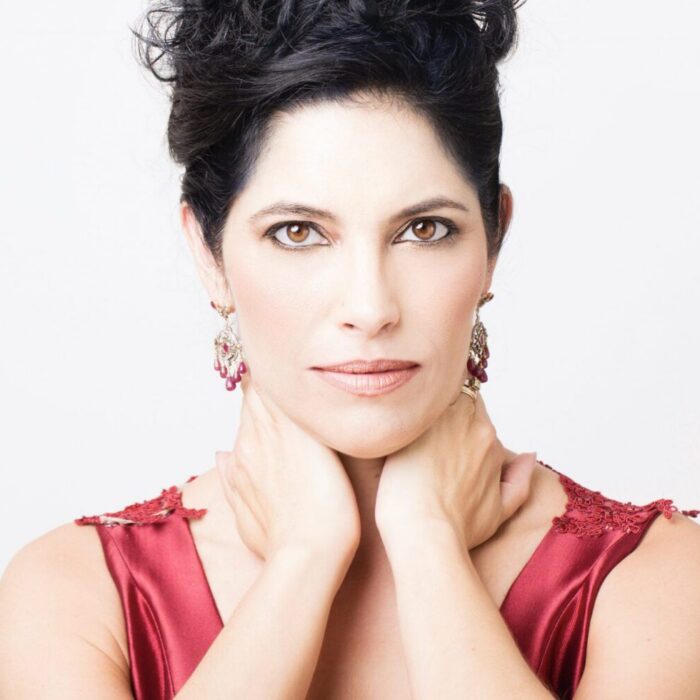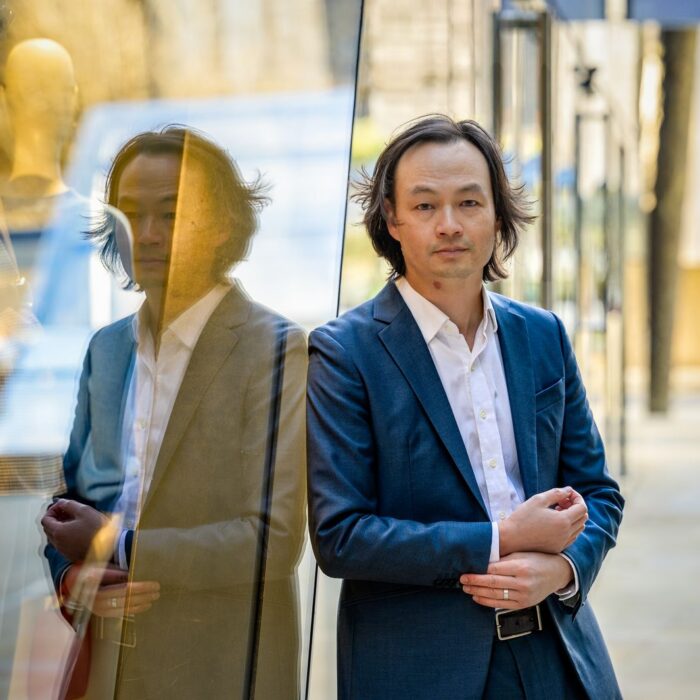
Q & A: Yuval Sharon on His New Book ‘A New Philosophy of Opera’ & the Upcoming Ring Cycle
By Francisco Salazar(Credit: Casey Kringlen)
Over the years, Yuval Sharon has amassed an “unconventional body of work” that has challenged opera norms. He is the founder and co-artistic Director of The Industry in Los Angeles and the Artistic Director of Detroit Opera.
He has published reviews and has directed operas at the Bayreuth Festival, Komishce Oper Berlin, Curtis Opera Theatre, and the Detroit Opera. His productions have given him the name “disrupter-in-residence” and he has challenged the perception of opera as aloof by urging the performance of works in parking lots and other unconventional spaces.
This past September he released his first book, “A New Philosophy of Opera” published by Liveright. The book which could be seen as an introduction to the art form also shows a 360-degree view of the art form, from the audience experience to the artist’s process.
OperaWire spoke to Sharon about the book, his inspiration for it, and what he hopes for the opera world in the future. He also gave a preview into his process for the upcoming Metropolitan Opera Ring Cycle.
OperaWire: What inspired you to write this book?
Yuval Sharon: In a way, it was an invitation that was extended to me by Robert Weil, who is one of the editors at Norton. He had read a review that I had done of translations of Brecht poems that he published. He read that review that was in the Los Angeles Review of Books and had been following the work that I had been doing.
And he came up to me and told me “It’d be so great to hear you talk about your Philosophy of Opera.” So he sent me the invitation in 2019 and I was excited about that challenge. So my original thought was I would take a year to write the book where I would not direct and focus all my attention on the book.
I thought I was gonna be writing it on a sabbatical and just totally removed from the world of opera for a year. I thought it would be reflecting and meditating on what opera is.
But then COVID came and I took the job in Detroit and one year became four years of writing. That was partially because I had to juggle it between my various projects, which I didn’t quite anticipate.
But I think the book is better for it because it reminded me what I wanted to be writing about and the vision of opera that I’m trying to portray in this book is one that’s deeply engaged with society and with our time and not removed, not distanced, and not in any way hermetically sealed from the way that the world is currently operating.
So as turbulent of a gestation period as this book was, I think it turned out to be the book that I wanted.
OW: When you were writing this book, was there something that you knew you needed to put in and you maybe didn’t know how to put into words? And what was something that you learned from writing it?
YS: I’ve never done an in-depth explanation of what it is that a director does. Why I believe the director’s role in opera is so important or the way I see my perspective in opera, reflecting a larger picture of what I’d like to see in opera.
There’s a lot of discussion about what a director does and the kind of interpretive license that directors take and why that’s something that should be encouraged and supported. I think we need to think about opera not just as a regurgitation of old ways representing these works, but looking at new ways to articulate these pieces and how much the production side of it is a place for constant renewal.
I would talk about it all the time especially when I took the job in Detroit but I never laid it out in any kind of formal argument like I have in this book. So, for me, going through that process and giving language to what that process is about, about ambiguity, about narrative, and about the director’s role, it felt like I had to articulate it in this book.
I went through that process in chapter four. It lays out what the director does, how a director, a composer, and a librettist all grapple with narrative, and how we identify an interpretation and develop an interpretation. I was also looking at how can we maintain mystery and ambiguity and the ability for the listener and the spectator to be empowered by the process, not made passive by that process.
In another chapter I wanted to express the tension between what is amorphous in music, this notion of the abstract reality versus needing to put costumes on singers and all of these things that are purely material on something that is actually in the end, fundamentally immaterial, and you could even say metaphysical.
And that tension between the spiritual material, I find that to be such an enormously fascinating aspect of opera and sometimes makes opera seem quite ridiculous where the material realization is just completely outside of what’s happening spiritually. And I really wanted to find ways to articulate that.
So I think I had the freedom of a kind of large-scale writing over the course of 300 pages that really allowed me to articulate those ideas much better than my short director notes.
OW: I like that you put this case study of “The Magic Flute” in Berlin. I thought it was great to be able to just put your own experience here from this production.
YS: I wanted to make sure that it’s clear that opera is just as much practical as it is theoretical. And I think that’s another aspect of the book that I wanted to demonstrate. That’s why I wanted a whole chapter on the singers, even though I’m not a singer myself. I wanted to give voice to three particular singers that I think are real examples of singing actors.
I wanted to showcase that kind of performance quality and that a lot of them just spend time in practice rooms. I wanted to talk about how much of it is not just the finished product of opera but this incredible craft that all these artists devote their lives to. I wanted to make sure that that aspect of it is clear and that is why I really wanted to put two very concrete case studies.
Maybe they’ll be quite illuminating the way behind-the-scenes featurettes can be. It goes into the making of an opera. But I think that contributes to some demystification of what opera is for people and maybe that helps people understand what it is that they’re seeing.
One thing that I talk about that I think is one of the biggest challenges for first-timers who go to the opera is the notion that the entire opera is bound together. So what you’re hearing, what you’re seeing, what you’re reading, and what you’re experiencing, it’s all one big thing and it’s very hard sometimes to parse out the individual elements and to understand why an individual is not engaged.
You have to ask, “Why is that? And where does the text stop and the performance start?” There’s opera and there’s so much gray area. And that’s why I think ambiguity is such a fantastic quality of opera because the experience of it is so ambiguous. And I’d love to see this book offering audiences the language to understand that and articulate what it is that makes it.
And for that, I think my own experience of just the making of it and seeing the idea that is purely theoretical undergoes this practical process of coming to life. And sometimes it doesn’t really work right away and sometimes it takes a little while and the artists need to go back and refine.
Opera producers should not only be investing in directors but also composers and librettists. Let’s invest in them coming back to work and people advising a project because theater has a lengthy preview process in which they sit and sometimes cut whole scenes or cut characters. And opera does not have that. It’s really hard to get it all right the first time. So I wanted to convey all of what it means for somebody who may not know about some of the process.
OW: You talk about opera as the anti-elite art form. And it’s interesting because opera had a massive audience back when it was first produced. Today it is “an elitist art form” but it has influenced other art forms like Broadway. How do you feel about this concept?
YS: That is probably a chapter that a lot of people will be able to relate to because I think that most people’s first encounter with opera involves some brushing up against elitist attitudes and if you’re somebody that doesn’t feel like opera, already belongs to them for some reason, it can be very off-putting.
I think that is one of the biggest challenges facing opera today. Opera is trying to eliminate those things that make the art form itself exclusionary and off-putting. It’s not even just about newcomers to opera. It’s about making sure that we know opera is for everybody and that it does not require musicology or a college degree, and you should not be required to know another language. You shouldn’t even be required to know operatic form and conventions.
You should be able to come in and have a powerful, emotional, and intellectual experience by coming to the opera without any preconceived notions.
But a lot of the trappings that opera institutions tend to traffic in are a lot about a kind of flattery of a particular type. I think that there is a strand of opera that was always about the kind of glorification of an aristocracy in particular. But at the same moment, opera was coming to be as a courtly entertainment and popular.
Next year in Detroit we’re doing an opera by William Grant Still and I wish I would have had him in my book. One thing that was so fascinating for me about him was realizing that many composers interested in opera did not for the most part have their pieces premiere in an opera house. They had their their operas premiere on Broadway.
Virgil Thompson’s operas were on Broadway as were Menotti’s and Gershwin’s. So this notion of Broadway being something that automatically goes into the circulation of culture and that the music that is being written is not going to be hidden in some sort of ivory tower. And all of these things I find much more egalitarian and the kind of approach to opera that American culture is sort of directed away from. And I think we are finding ourselves with institutions that feel compelled to encourage a sense of elitism. I think that the art form could thrive if we get rid of it.
OW: Baz Luhrmann produced “La Boheme” on Broadway a few years ago. It was not such a big success but it was a way of bringing opera to the mass audience. When people discover the artwork, they love it and sometimes that does not happen with newer works due to the lack of melodic qualities. But the experience is different for others. So what do you feel is a way of bringing audiences to the art form?
YS: I don’t think there’s any one way to do it. I do hope that readers of the book will understand that it’s not offering a silver bullet solution. It definitely doesn’t show how we’re going to fix it all but instead, it points towards a lot of different opportunities.
In the second half of the book, I advocate for thinking about opera in other kinds of venues, in other theaters or non-theaters. What does it mean to do a piece beyond the opera house? I think that older works can be done in ways that draw a real connection to our time and it is a fantastic way to get people excited about opera. I think that these works are clearly making a connection in terms of the subject matter or a lived experience can also make an impression. I think we’ve seen that some works can touch a nerve with people such as “Fire Shut Up in My Bones” and “X.” These operas had huge box office success at the Metropolitan Opera.
And for us in Detroit, when “X” was performed here, it was sold out and it was the first time that the Detroit Opera was sold out since 2005. There are lots of ways of bringing opera to the public.
And Baz Luhrmann’s “La Boheme” was astonishing. Was it as successful as a Broadway musical? No. But running Puccini for 200-plus performances on Broadway is incredible. And I think that pointed towards the fact that there could be so much more of an audience for opera. However, the institutions that are administering opera to the public of America do need to think about how these works are being presented and how they engage the audience.
OW: As an Artistic Director of the Detroit Opera, what do you think are the challenges of marketing opera?
YS: I don’t talk about this in the book, but I have felt firsthand the lack of understanding of how to market opera. We have a great marketing director now in Detroit, but I was reminded in the search for her. It took years before we finally found somebody that was the right person and we did find the right person.
But it took us a long time because the opera needs to find a way to communicate to its audience that is competing with all these other forms of entertainment. The Detroit Opera for example is right next to Comerica Park where the Tigers play. And of course, there’s a difference between sports and opera, but not much. What are people doing on their night off? What are they doing with their free time?
And while we are not technically competition with them, we have to know that that is an option that people are going to.
So marketing has a tall order in this country because we rely so much on marketing to get the word out about what we do. So how do we do that in a way that does feel inviting and coming from a place of really knowing and loving the work? And that’s not always easy finding those folks.
OW: This summer it was announced that you will be directing the Metropolitan Opera’s new production of “The Ring Cycle” and “Tristan and Isolde.” What kind of sneak peek can you give about these upcoming works?
YS: I can’t give things away right now, but it’s partially because the concept is actively being developed. So, what can I say? First of all, I’m just unbelievably excited to do these projects. First of all, I talk about it in the book quite a bit because I do think it is the single hardest opera in all of the repertoire for a lot of the reasons I talk about it in terms of what it means to materialize a piece that’s so immaterial. It’s so much about these psychological and emotional states. So finding the right material realization of it is incredibly challenging.
But I’m so excited about it especially when you do it on the largest stage in America and one of the largest ones in the world. So that’s thrilling to me. The Ring is the creation of an entire universe over the course of four evenings. So I’m not rushing into making decisions because I have four to six years. After all, they’re not going to do cycles until 2030.
So I’m not rushing into decisions here and so when it arrives it can hopefully speak to where we are in 2030 as a human race. Wagner was trying to speak to us as a human race and it’s the oldest and most ambitious work in the entire operatic repertoire.
So I’m letting the process unfold and I’m also thinking about it in relation to where we are nationally and whoever wins this next election will certainly influence the way I think about what kind of Ring we want to bring to New York. So I want to make sure that the concept for the production can also develop and ripen. It’s going to be a developmental work in progress over the next few years.
Categories
Interviews

